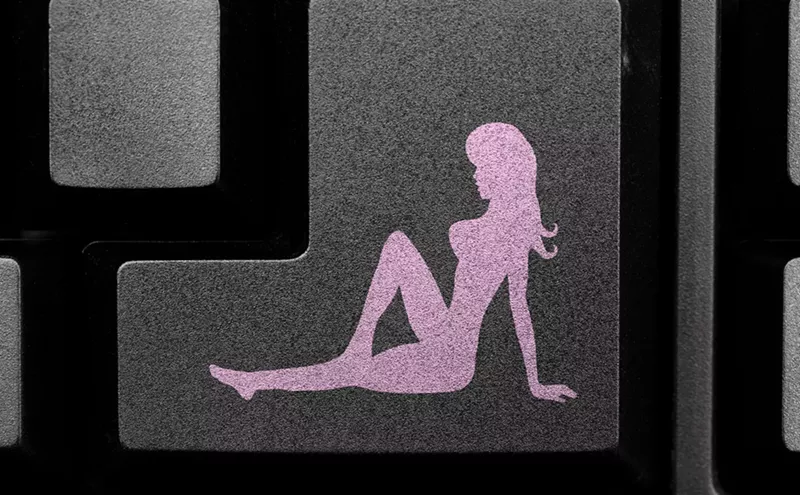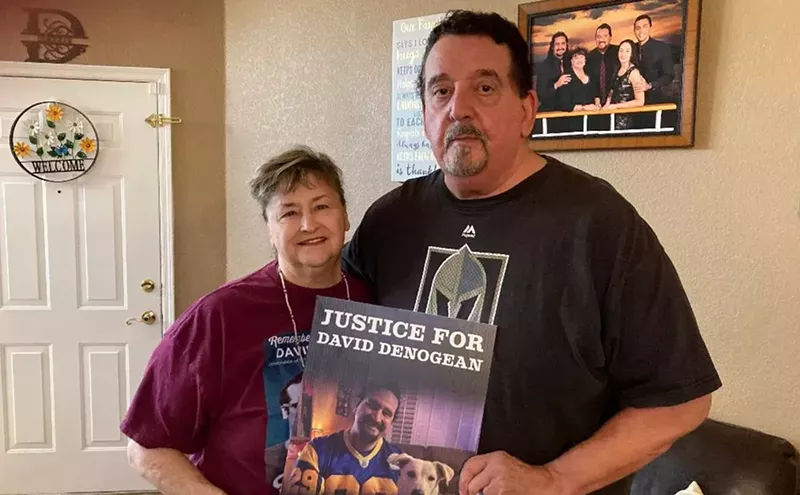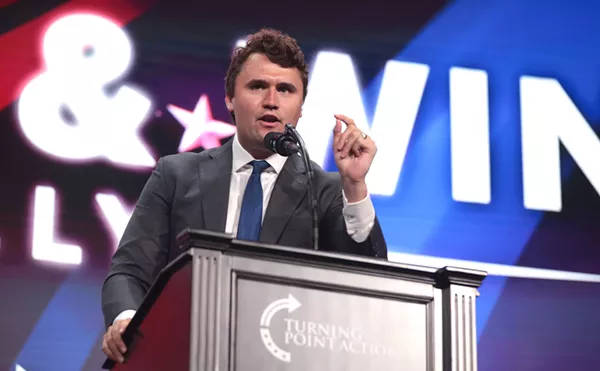Unless you live under a rock, you know Sheriff Joe Arpaio: He's the aging lawman with a doughy face you see on TV, delivering sound bites about being "America's toughest sheriff." The one who relishes publicity.
And it's not just about being on TV, although anyone who's met Joe Arpaio will tell you that's a big part of it. No, Arpaio loves being sheriff — enough that he'll do just about anything to keep the job.
It's not just about running smart campaigns and working hard. That would be understandable, even admirable.
Instead, it's about intimidation and retribution. It's about coming after deputies who question the sheriff's carefully polished image. It's about seeking revenge on former allies who dare to support someone else. It's about silencing political opposition.
In his 14 years as sheriff, Arpaio has turned Maricopa County jails into dangerous hellholes. People have died in restraint chairs and they've died in inmate brawls. Miserable conditions even prompted an unprecedented investigation by Amnesty International, which, in its first-ever probe into a county jail, concluded that Arpaio's operation violated basic human rights.
But the most dangerous place in the county, after the jails, is on Sheriff Joe's bad side. Oppose him, and he'll follow you around, rifle through your trash, hold a press conference about how bad you are, even arrest you.
And these days, the sheriff's power to intimidate his political enemies is greater than ever.
That's because under Rick Romley, the County Attorney's Office served as a voice of reason to, and occasional brake on, Arpaio. Under Romley's successor, Andrew Thomas, the office has become a willing partner in political shenanigans.
No potential rival is immune from the pair's "investigations." No conflict of interest is ever acknowledged.
And no case is too petty to pursue, so long as the TV cameras are rolling.
Longtime readers of this newspaper are familiar with Joe Arpaio's history. Court records, signed affidavits, interviews, and archive searches reveal a long list of vengeful actions Arpaio has taken against political opponents:
• Sheriff's Office employees who've spoken out have endured slanted investigations from the sheriff's internal affairs unit, been transferred or fired, and sometimes been harassed at their new jobs.
• At least two men, Tom Bearup and Ernest Hancock, were tailed after they announced their interest in Arpaio's job. Arpaio's second-in-command, David Hendershott, targeted Bearup as a threat to the sheriff. Hendershott even ordered an underling to write a memo that painted Bearup, the sheriff's former top deputy, as a security risk.
• Deputies tapped the phone of Bearup's campaign aide, Jim Cozzolino. Deputies also rifled through his trash. Cozzolino was later arrested under dubious circumstances and served four months in jail. Cozzolino sued, claiming that Arpaio violated his constitutional rights. The sheriff was forced to settle.
• Republican activists say they've been penalized for backing candidates other than Arpaio. After Lee Watkins backed another candidate, deputies raided his business and home and launched a public investigation. Three years later, no charges have been filed.
• Arpaio's most recent foe, Dan Saban, was painted as a sexual deviant when Arpaio's people slipped a damaging report from a questionable source to a TV reporter. After Saban sued, the sheriff's lawyer wrote letters attempting to get Saban fired from his current job.
• Dan Pochoda, the Arizona ACLU's legal director, publicly fought with Arpaio about immigration and Arpaio's treatment of a jailed tuberculosis patient. At an immigration rally, sheriff's deputies hauled Pochoda to jail rather than issue him a citation. They claimed that Pochoda refused to leave the rally, held on private property.
Justice in Maricopa County has gotten only more warped since Arpaio and County Attorney Andrew Thomas formed an alliance.
They even formed a task force created to fight corruption, called Operation MACE. The task force has had questionable results:
• Its first indictment was of Russ Jones, a state legislator from Yuma. The charges were petty, at best, and were quickly dismissed by a judge.
• Seven months ago, the pair made much ado about their investigation of Attorney General Terry Goddard — one of Thomas' top political rivals. Thomas and Arpaio have issued numerous press releases, but the investigation has yet to yield a single indictment.
• A top Thomas aide worked closely with sheriff's deputies to investigate a campaign mailer from Democrat Jackie Thrasher, who was running for the Arizona House. Despite three search warrants, and the seizure of four computers belonging to a Democratic operative just weeks before the 2006 election, the case boiled down to a questionable decal shown in a photo on a campaign brochure. No charges have been filed. Thrasher's opponent, Jim Weiers, is the father of a Maricopa County sheriff's deputy.
The most recent example of Arpaio and Thomas' shoddy teamwork has been their most public screw-up. It's the story of what they tried to do to this newspaper.
Arpaio was angry that New Times printed his home address in a 2004 story that examined the sheriff's hidden commercial real estate investments. True to form, Arpaio sought revenge.
(Arpaio's office declined all comment for this story, citing ongoing litigation with this newspaper.)
In the New Times case, Arpaio wanted Thomas to prosecute under a never-tested Arizona law that made it a crime to publish a law enforcement officer's home address online.
Initially claiming a conflict of interest, Thomas referred the case to the Pinal County Attorney's Office. But, apparently at Arpaio's urging, Thomas asked for the case back and appointed his former boss, Dennis Wilenchik, as special prosecutor — an appointment rife with conflicts. At the time, Wilenchik was representing Arpaio in several civil lawsuits. The Arizona Supreme Court bars lawyers from prosecuting a matter if they've represented one of the parties civilly and conflicts exist.
Beyond legal ethics, Wilenchik's appointment backfired badly. The special prosecutor issued subpoenas that sought extensive personal information about each of the paper's online readers. When New Times decided to go public with the invasive demands, and the challenge to its readers' constitutional rights, Wilenchik not only asked the judge to fine the newspaper $90 million, he also demanded that the executives who published the story be arrested.
Arpaio's men, naturally, were there to do the job.
Public outcry was so great that Thomas was forced to fire Wilenchik as special prosecutor less than 24 hours after the executives' arrests. But Thomas and Arpaio weren't headed for divorce. At the news conference where Thomas announced Wilenchik's termination, he suggested that New Times apologize to the sheriff.
Legend has it that Joe Arpaio first ran for sheriff because he wanted to get even.
Arpaio had been a Drug Enforcement Administration agent, famously saddled with the moniker "Nickel Bag Joe" because of his enthusiasm for arresting even the pettiest violators. After retiring from the DEA, Arpaio and his wife opened a travel agency and won a contract with the Maricopa County Sheriff's Office.
But when the contract was up for renewal, the Arpaios lost.
One reason, according to an affidavit from a deputy on the selection panel, is that Joe Arpaio made a bizarre pitch to the panel, altering the terms of his company's written proposal. Some thought the offer amounted to an illegal kickback to the Sheriff's Office.
Arpaio was livid over the loss. The contract was worth about $200,000.
According to an affidavit filed by a former deputy, Arpaio called then-Sheriff Tom Agnos and begged him to reconsider. When the sheriff refused, then-deputy Kelley Waldrip claims, "Arpaio threatened to run against Agnos in the next election."
Agnos was already badly scarred by the fallout from the Temple murder investigation, which his staff had botched. (Nine Buddhists were shot and killed execution-style, but Agnos initially arrested the wrong guys: five minority kids from Tucson.) Arpaio seized on Agnos' failure, and in 1992, four years after he lost the travel contract, Arpaio passed a crowded field to become sheriff.
Aides later reported that Arpaio carried around a list of names of people who'd worked for his opponent, people who'd contributed to his opponent, and people who'd denied his company the travel contract.
"Arpaio would take the list out when he encountered a person who was on the list," wrote attorney Joel Robbins in a recent court pleading, "and would make a comment to let the person know that he knew that they had worked against him."
Any deputy whose star came close to eclipsing Arpaio's learned to watch his back. Former deputies say Arpaio demanded that photographs in the Sheriff's Office depicting his top aide, Russell Pearce, be replaced. Pearce's photo had to be smaller than Arpaio's. (Pearce was no dummy; he left the office soon after.)
And when Arpaio's second-in-command, Tom Bearup, said that he'd be willing to run for sheriff if Arpaio ran for governor, Bearup was exiled to an office at the Madison Street Jail.
When Bearup finally resigned, the sheriff opened a criminal investigation into his behavior, though no charges were ever filed. Arpaio also put Bearup and his family under surveillance, even tapping their phone, according to the testimony of former deputies.
It was Bearup who first experienced what would become a frequent move in the Arpaio playbook: He was accused of being a threat to Arpaio's security.
Former sheriff's deputy David Cool saw the machinations. According to a letter Cool would later write to County Attorney Rick Romley, one of Bearup's sons had told Cool's wife that his 20-year-old brother was stockpiling explosives under his bed.
Because Bearup had such a public falling-out with Arpaio, Cool decided to take the problem to the federal Bureau of Alcohol, Tobacco and Firearms rather than the Sheriff's Office. The ATF appears to have ignored the complaint.
Not so the sheriff. Months later, Cool was visited by Arpaio's top aide, David Hendershott.
Hendershott questioned Cool about when he'd last seen Bearup. Cool said it had been in church, but that Cool had since left the congregation.
"When you went to his church, did he say that I was Satan?" Hendershott asked, according to Cool's letter.
Surprised, Cool said no. But Hendershott pressed him.
"Did he ever say that I was the devil or wished that I died?"
"No," Cool replied.
"Did he ever ask for you to pray for him?" Hendershott asked.
"Of course he did," Cool said. "We always pray for everyone. For each other, for people that are sick, giving birth, in financial trouble, marriage trouble. That is the nature of the Christian church." Eventually, Cool told Hendershott about the problems with Bearup's son and the explosives.
Hendershott left Cool's office, according to Cool's letter. Five minutes later, the phone rang. It was Hendershott, ordering Cool to write a memo.
"Title it 'Security Concerns,'" Hendershott said, according to Cool. The first paragraph should talk about the explosives under Bearup's son's bed, Hendershott instructed. The second should talk about how upset Tom Bearup was "and how he used to pray for help and strength to battle the attack from within the Sheriff's Office."
Cool blanched. He didn't think the incidents related to each other.
"Just write the memo," Hendershott said.
Cool followed orders. Days later, two detectives came to see him. They wanted to talk about the memo. When Cool protested that he didn't think the prayers and the explosives were related, that there wasn't really a threat to Arpaio, the detectives were confused. Cool explained that he'd written the memo under orders.
The detectives left but returned later, this time with a video camera. They wanted to talk about the memo. Again. Cool explained again that he'd been acting under orders.
Five minutes after he left the videotaped interview, Cool received an angry call from Hendershott.
"I never ordered you to write that fucking memo," Hendershott said, according to Cool's letter. "You don't understand. I need to investigate any threat against the sheriff."
Cool wrote to the county attorney because he was worried about his job and wanted whistleblower status to protect him from the sheriff. When the letter became public, the sheriff fired him anyway — whistleblower status be damned.
Depositions and affidavits from former deputies make one thing clear: In the Maricopa County Sheriff's Office, harassment isn't the work of a few lone wolves. It's a directive from the top. Many dubious activities by deputies can be traced directly to Chief Deputy David Hendershott.
As Arpaio has admitted under oath, Hendershott is the operational head of the Sheriff's Office. According to the testimony of a half-dozen men who've worked under him, Hendershott is as vindictive as they come.
Under Hendershott, the Sheriff's Office developed a special squad devoted to investigating anyone who opposes the sheriff.
In a deposition later cited in court filings by attorney Joel Robbins, Hendershott once described the handpicked Selective Enforcement Unit, or "threat squad," as "a specialized unit . . . formed to do nothing more than follow around the sheriff's political enemies and catch them doing something wrong."
"They pretty much do what he tells them to do," said deputy Sergeant Wayne Scoville, under questioning in a lawsuit.
Sometimes that means going after the sheriff's own guys.
As a deputy in the late '90s, Kelley Waldrip spoke with a New Times reporter who was looking into possible misuse of funds in the Sheriff's Office. When the sheriff found out that Waldrip had talked to the reporter, he was livid. Waldrip announced his retirement partly to avoid being fired.
But the Sheriff's Office didn't let the matter go. According to an affidavit Waldrip later filed, several years after he retired from the office, Waldrip's supervisors in the Naval Reserve informed him that they'd received an allegation against him. Supposedly, he'd misused his Navy Criminal Investigative Service credentials.
Waldrip's supervisor said that Arpaio was behind the matter.
"Among the allegations was that I had violated several Sheriff's Office policies in my relationship with the press and was thus an individual unworthy of a position of trust within the U.S. government," Waldrip wrote.
The Navy ultimately concluded that Waldrip had done nothing wrong. Even then, the sheriff continued to keep an eye on his former employee.
In December 2002, Waldrip wrote in his affidavit, the "threat squad" contacted Waldrip's employer to obtain the IP address on his computer. (That would have allowed Arpaio to track Waldrip's online activity.) The employer, a law enforcement agency in California, refused to supply the information.
The threat squad also has targeted people who've had no connection to the Sheriff's Office. They've been opponents and critics of the sheriff. In fact, it was the threat squad that arrested this newspaper's executives.
Sometimes, those who've angered Arpaio just happened to be in the wrong place at the wrong time.
In 2002, a group supporting a ballot initiative to legalize slot machines hired actor Nick Tarr to portray a character named "Joe Arizona," a thinly veiled caricature of Arpaio. (Arpaio was endorsing a rival ballot measure.) "Joe Arizona" wore the sheriff's trademark pink boxer shorts, a hat like those worn by Canadian Mounties, and plastic badges that said "Sheriff Joe" and "Sheriff Nick."
On Halloween, a costumed Tarr entered a restaurant where Hendershott happened to be eating. Hendershott, court files show, called the Arizona Department of Public Safety twice, asking it to cite Tarr for impersonating a law enforcement officer. DPS officers determined there was no crime and refused.
Hendershott then ordered his own men, the threat squad, to arrest Tarr. No surprise: They did.
The charges were later dropped, but Tarr's lawsuit against the sheriff is still pending.
Jim Cozzolino wasn't really a political guy, but he had friends in law enforcement. So, when Tom Bearup ran against Arpaio, he asked Cozzolino to help with his campaign. And when Bobby Ayala challenged the sheriff in 2000, Cozzolino served as his campaign manager.
Next thing Cozzolino knew, his phone was tapped. His trash was regularly rifled by Arpaio's fledgling threat-assessment squad. And he was accused of making a death threat to Arpaio over the sheriff's radio frequency.
The death-threat case fell apart. And although Arpaio got a search warrant to investigate Cozzolino, the prosecutor never charged Cozzolino with a crime.
Three years later, Cozzolino made the mistake of giving the sheriff a chance to go after him again.
At the time, Cozzolino owned a Fountain Hills bowling alley. One night, a drunken employee was harassing a female coworker to the point of choking her. Cozzolino intervened, but was thrown to the ground by the much-larger man. He drew a gun and ordered the man to stop. A scuffle ensued, and Cozzolino's gun went off.
No one was injured, but the deputies who were summoned to the scene didn't seem to care.
"Jim was the one who tried to save me," Melody Nordman, the female employee, would later tell New Times. "But they made it clear they would have none of that idea. It was clear they wanted Jim's head."
Cozzolino was charged with attempted murder. The sheriff used that charge as an excuse to seize Cozzolino's car, claiming it might have been stolen. Arpaio didn't even bother with a search warrant.
Cozzolino eventually pleaded guilty to the lesser charge of illegal discharge of a firearm.
But Arpaio, true to form, wrote a letter to the judge arguing that Cozzolino should get the maximum penalty: eight years in prison. Not because discharging his gun was so awful, but because, Arpaio wrote, Cozzolino wanted to kill him. "[I]n his own warped way, [he] actually believes that he will become a hero by assassinating me," Arpaio wrote. "The threat of assassination, like assassination itself, should not be taken lightly."
The judge gave Cozzolino four months in jail — Arpaio's jail. While there, deputies stripped Cozzolino of his work-release privileges after he tested positive for crystal meth. Only after a deputy blew the whistle was Cozzolino able to get a second test showing he was free of drugs. He'd been set up.
After serving his time, Cozzolino sued Arpaio in federal court. The sheriff argued that the suit should be dismissed because, as a public official, he's immune from liability for doing his official duties.
Interestingly, Arpaio never disputed allegations that he'd sent deputies to tap Cozzolino's phone. He argued that doing so was not "highly offensive." As for seizing Cozzolino's car, and faking drug tests, he argued that these actions were "related to legitimate police activity."
The judge would have none of it.
"Without attempting to justify their seizure of the car or explain the circumstances of the drug tests, material facts exist as to whether these incidents were, in fact, 'related to legitimate police activity' and therefore not in violation of [Cozzolino's] constitutional rights," wrote U.S. District Judge Frederick J. Martone.
Arpaio settled the suit with Cozzolino soon thereafter.
Compared with what happened to Jim Cozzolino, what happened to Lee Watkins wasn't so bad. The sheriff still hasn't managed to arrest Watkins, after all. It was only Watkins' business that was destroyed.
Watkins is a player in Republican circles, and GOP candidates know to hit him up for fundraising. A pivotal backer in Evan Mecham's shocking gubernatorial victory in 1986, Watkins went to work for Mecham after the election.
After the impeached Mecham was driven out of office, Watkins became persona non grata. "I couldn't get a job at a car wash," he says.
So he started a towing business with two trucks. By 2004, he had 28, and his Cactus Towing was the biggest firm of its kind in the East Valley.
Watkins never hesitated to give money to politicians he liked and, for a while, that group included Arpaio. Then, an old friend, local radio personality W. Steven Martin, announced that he was challenging Arpaio in the 2004 election. Watkins told Arpaio that he was supporting Martin.
"I guess you're going to take your chances," Watkins quoted the sheriff as saying.
"I should have known right then," Watkins says now.
It wasn't even a year later when Ron McClure contacted the Sheriff's Office. McClure, who owned a rival tow firm, told a deputy that Watkins was engaging in unethical practices. He put the detectives in touch with two former Cactus employees who elaborated on the complaint. (Cactus had previously taken out a restraining order against one of the men.)
In April 2005, a manager at Cactus awoke to deputies banging on his front door at 4:30 in the morning. The deputies put the man's school-age children into a room alone and ordered their mother, in her nightgown, into a squad car. The deputies then seized box after box of "evidence" — including homework and Little League photos.
Deputies kicked in the doors of Watkins' rental property, too. Then they headed to Cactus Towing and took just about everything that wasn't bolted down: records, computers, cash, even employees' cell phones.
Because it was the last day of the month, and the company bills on the first, it was disastrous. "They timed it to put us out of business," Watkins says.
And they very nearly did. The raid was covered heavily on TV newscasts and in newspapers. (Watkins' lawyer, Kent Nicholas, says he received his copy of the search warrants from a reporter.)
Naturally, the municipalities that contracted with Cactus didn't like the bad publicity. At least one police chief told Watkins that a sheriff's deputy called and urged him to stop using Cactus.
Watkins sold the business for much less than what it was once worth. "We were getting beaten up so bad in the press every week, I had to." He's also paid "an army of lawyers," he says, proceeding to list nearly a dozen.
The raid was nearly three years ago. Last year, Arpaio told one reporter that he'd finished the investigation and was sending the case to prosecutors.
Not a single charge has been filed.
"Everybody says, 'Don't say anything, and it'll go away,'" Watkins says. "And probably, it would. But some of us should stand up and say that enough is enough.
"We got accused of so much stuff. And my belief is, it was all because of politics."
In the 2004 election, Arpaio managed to beat Dan Saban in the primary, and Lee Watkins' old pal, W. Steven Martin, in the general election. Sheriff Joe would get his mug on TV for another four years.
But everything around him was changing. Arpaio's old nemesis, County Attorney Rick Romley, had retired after 15 years in office. The moderate Republican was to be replaced by Andrew Peyton Thomas, an ambitious Harvard-educated lawyer. Though Thomas had previously campaigned unsuccessfully to become attorney general, he was known for writing books on conservative theories, not for his courtroom experience.
Thomas' conservative credentials proved to be the key to his election. Because an open seat in the County Attorney's Office is a rarity, the primary drew five Republican candidates. Thomas distinguished himself by running far to the right while the others duked it out in the center.
Then, in the general election, Thomas drew a Democratic opponent, Don Harris, so controversial that the party's own chair announced that he wasn't supporting him. Thomas won handily.
When he took office in January 2005, Thomas made it clear he was following Arpaio's playbook. Politics and retribution would be the order of the day.
The prosecutor who ran the county's sex crimes unit, Cindi Nanetti, a widely respected and well-liked veteran, had openly campaigned for Thomas' opponent. Despite being the reigning "Arizona Prosecutor of the Year," Nanetti was demoted.
Meanwhile, Thomas packed his eighth-floor "executive team" with political activists with little experience in criminal prosecution:
• Tim LaSota was appointed after being active in the far-right Federalist Society. (His father Jack, a well-known lobbyist and former Arizona attorney general, chipped in money for Thomas. And Tim LaSota is connected in other ways: He's married to the niece of Congressman Ed Pastor, D-Phoenix.)
• Miguel Martinez is Thomas' brother-in-law. He isn't a lawyer, but he was nevertheless given a job as a community liaison.
• Rachel Alexander was a GOP activist once named "Republican babe of the week" by a New Jersey-based Web site. She was made Thomas' policy adviser, a job that seems to consist mostly of blogging about conservative issues, prosecutors say.
• Phil MacDonnell, a fellow Harvard grad, is a veteran lobbyist who'd represented everybody from the Arizona Newspaper Association to R.J. Reynolds Tobacco Company. Although MacDonnell hadn't worked as a prosecutor in 20 years, he was named chief deputy county attorney
• Mark Goldman was Thomas' oddest choice. Though trained as a lawyer, Goldman made his money in the mortgage business. (Records show he still owns two brokerage companies in Arizona.) Goldman was Thomas' top donor, chipping in a staggering $10,000 during the 2005 campaign. His reward was a volunteer position on the eighth floor.
Veteran prosecutors say the appointments wouldn't have been so terrible under a different boss. Everybody pads their payroll a little bit. But Thomas is distant, they say. He's more interested in writing articles about legal issues and giving press conferences than day-to-day operations. Some former prosecutors suggest that they were at the mercy of Thomas' ideological gatekeepers.
Some of the office's most questionable decisions have involved Arpaio. The two have worked together so closely that some of his own prosecutors privately deride Thomas as "Little Joe."
And some prosecutors have been troubled by Thomas' close relationship with Arpaio. It isn't just that they believe Arpaio is more interested in building his reputation than in following the law. It's that they believe the prosecutor must serve as a check on all law enforcement agencies.
"It's a matter of checks and balances," says one former deputy county attorney. "We represent the sheriff civilly, but sometimes you have to tell your client, 'No, you can't do that.' If the sheriff was about to do something illegal, Romley would tell him he couldn't do it. And the sheriff didn't like that.
"Well, Andrew Thomas has no desire to do that."
Thomas' spokeman, Barnett Lotstein, is himself a holdover from the Romley administration. In an e-mail, he says that criticism of Thomas as distant is "incorrect" and praises his top-level appointments as "seasoned criminal prosecutors with extensive prosecutorial and trial experience."
And Lotstein defends his boss' relationship with Arpaio.
"During the administration of former County Attorney Rick Romley, the Sheriff and County Attorney were continually at odds with each other," he writes. "The media regularly criticized them for their lack of cooperation and public bickering. Now that County Attorney Andrew Thomas has ended this lack of cooperation with the Sheriff's Office, he is being criticized by some for fostering good relationships. How disingenuous." (View Lotstein's complete statement here.)
But considering some of the shenanigans that Arpaio has engaged in, cooperation hardly seems prudent. That became startlingly clear in the aftermath of the sheriff's smearing of his 2004 rival, Dan Saban.
Saban had been a respected cop in Mesa, and he'd won endorsement from several GOP insiders and law enforcement agencies. It was the toughest challenge the sheriff faced in years.
If Arpaio was worried about his opponent, the e-mails from Ruby Norman must have seemed like manna from heaven. Norman said she had dirt on the sheriff's opponent. And when Arpaio's aides called her back, even they must have been shocked by just how filthy the dirt was: Norman said she was Saban's adoptive mother and that he'd raped her.
The alleged rape had happened nearly 30 years earlier, years past the statute of limitations. An accusation that old was problematic, and it didn't help that Norman proved to be remarkably fuzzy on details. She didn't even know how old she'd been when the alleged assault took place.
Nevertheless, the threat squad was sent to Apache Junction to take Norman's testimony. The squad was instructed to write a report for the sole purpose of creating a written record that Dave Hendershott — yes, that Dave Hendershott — could give to a reporter at Channel 15. As it turns out, Hendershott alerted the reporter to the story before the threat squad even interviewed Norman.
Channel 15 aired the story, and Saban, not surprisingly, lost the election. But because Norman's allegation turned out not to be true, Saban sued Arpaio and Hendershott for libel.
It's the county attorney's job to represent the sheriff in civil matters. But rather than put one of his employees on the job, Thomas appointed his former boss to handle the case. Dennis Wilenchik is both a skilled trial lawyer and an expensive one. (His firm has already been paid at least $255,000 for the Saban case, and more is sure to come.)
Wilenchik didn't just offer a defense in the courtroom. In the months before the trial, Wilenchik wrote a series of letters to the governor, the attorney general, and the agency that licenses police officers. The letters demanded that Saban be stripped of his law enforcement certification and be fired from his job.
Not to be outdone, Hendershott filed no fewer than three bar complaints against Saban's lawyer, Joel Robbins.
In all three cases, the State Bar of Arizona found "insufficient evidence to support an ethical violation," a Bar spokeswoman says.
In January 2007, Joe Arpaio and Andrew Thomas made their boldest move yet. They announced the formation of an anti-corruption task force, Operation MACE, to root out abuses of the public trust.
They told reporters that they'd seized hundreds of boxes of records from the Maricopa County Community Colleges. Money, they said, appeared to be missing.
Three months later, the pair announced the task force's first indictment, which had nothing to do with the community colleges and not much to do with corruption. A state representative from Yuma, Russ Jones, had signed his 2006 re-election petitions, saying he was the "circulator" who witnessed their signatures. But Thomas told reporters that Jones was really in Phoenix while the petitions were signed in Yuma.
Jones' opponent had made the same complaint during the campaign, and the petitions in question had been thrown out via a lawsuit. (The Arizona Supreme Court had ruled that the mistakes didn't rise to the level of petition forgery.) Jones had enough good petitions to make it on the ballot, but he ultimately lost the election.
Thomas indicted Jones on nine felony counts of "presenting a false object for filing" and one felony count of "willfully concealing his activities."
That could have meant 10 years in prison — for petitions that made no difference in the election.
Jones' lawyer, Jim Belanger, believes the pair just needed a Republican. "Russ Jones was a politically opportunistic target," he says. "He was an out-of-county, out-of-office Republican."
After all, in the same month Jones was indicted, Thomas and Arpaio announced they were investigating Democratic Attorney General Terry Goddard.
The Goddard case also seemed a huge stretch. Goddard had been investigating Republican State Treasurer David Petersen for a host of violations, but charged him only with a misdemeanor as part of a plea agreement.
Just before Petersen left office, his second-in-command had approved a fat payment for the attorney general's work representing the office on an unrelated civil matter. Thomas and Arpaio questioned whether the payment had influenced Goddard's acceptance of the plea bargain.
From the very beginning, Thomas and Arpaio's tactics seemed designed to generate publicity. Arpaio actually announced the investigation at a press conference, and he gave each reporter in attendance a tape recording of what he considered the key piece of evidence.
Goddard's lawyer, Ed Novak, says he has never seen behavior like that in his decades as a criminal defense attorney.
It's even more disturbing because Goddard and Thomas are widely considered two of the top contenders for the governor's office in 2010. By holding the widely publicized press conference, Thomas was getting a free attack ad against his future opponent.
Arpaio and Thomas' quest for publicity has continued throughout the investigation. As Goddard pointed out in a letter to Thomas, Arpaio issued a press release on August 16 claiming that Goddard wasn't cooperating. The release was ignored, and the sheriff issued the exact same release the next week.
"Five days later," Goddard wrote to Thomas, "you and the sheriff held a press conference to accuse the Attorney General's Office of 'stonewalling.'" A few weeks later, the sheriff issued yet another press release. (See Goddard's complete letter here.)
For all that publicity, Novak says, Arpaio and Thomas have sought to conduct only a single witness interview — with a tech guy — to question why it was taking so long to turn over records to the prosecutor.
Novak says the initial subpoena generated a list of "well over 12 million documents." Novak and his staff have managed to cull that list to a more manageable 60,000 documents.
"This takes time," he says.
Goddard, who declined to be interviewed for this story, sent a three-page letter to Thomas in October, criticizing the handling of the case.
"I was stunned at the time — and I still am — that the Sheriff or any other law enforcement officer would announce the beginning of a criminal investigation at a press conference or would hand out copies of his key evidence," he wrote. "The public blast of the Sheriff's press conference certainly sounded like the opening salvo in a political witch hunt. Unfortunately, subsequent events have reinforced that initial impression."
Goddard asked Thomas to recuse himself from the case, noting that they'd run against each other in the 2002 attorney general's race. "[T]here is a growing public perception that your investigation is an unwholesome, political 'dustup' between you and me," he wrote.
Thomas has refused to step down. The "investigation" continues.
"But for the publicity, I wonder if the investigation would have been over long ago — or never have been started in the first place," Novak says.
But if Russ Jones' fate is any indication, Terry Goddard may find himself vindicated.
Just five months after Thomas and Arpaio announced the first indictment resulting from Operation MACE, the judge tossed out the indictment. Jones' lawyer had argued that the prosecution of his client was unfair because no one really knew what "circulator" meant, much less what it meant to be "present" when a petition was signed.
The judge agreed.
That's not to say that Jones hasn't been punished. He's already paid $80,000 in legal fees. And Thomas has announced he's going to appeal.
But Jones isn't complaining.
"Had I not had the resources to pay for a good defense, this could have turned out much differently," he says. "And that would be a real travesty. When you're just an ordinary citizen, when one of these prosecutors goes off on a wild goose chase, you're in real trouble. They're not accountable to anyone."
Jones wonders what the point was. The sheriff sent six guys to Yuma for weeks to interview people who'd signed his petitions. And the County Attorney's Office had to develop a creative legal theory just to charge a Yuma guy in the Maricopa County courts.
To a guy from somewhere else, a guy who hasn't had to deal with Arpaio and Thomas, it makes no sense.
"Just think of how much money that was, when they're so short in their budget," Jones says. "I can't imagine how much it cost. And what good did it do for Maricopa County?"
Just two weeks before the November 2006 election, a graphic designer named Christy Fritz found herself dragged into Arpaio's orbit. That's when a sheriff's deputy showed up at Fritz's home, armed with a search warrant that let him confiscate her computers. Her utility bills. Her e-mails. Even her financial records.
You might assume that Christy Fritz was a drug dealer or an identify thief. But the truth is that, even by the sheriff's account, Fritz did only one thing wrong.
She worked for a Democrat.
Last fall, Democrats were surging in races across the country, and Arizona's Speaker of the House, Representative Jim Weiers, a Phoenix Republican, was feeling the heat. Political insiders were buzzing about a poll that showed Weiers' challenger, Jackie Thrasher, pulling ahead. Could the Speaker's seat be in play?
In late October, a new Thrasher campaign mailer hit the streets.
The mailer showed a corrections officer talking to the Democratic candidate. No big deal — except that Thrasher was pictured in front of a car sporting a Maricopa County Sheriff's Office decal. Though the Arizona Conference of Police and Sheriffs had endorsed Thrasher, Sheriff Joe had not.
Campaigns often employ questionable tactics. But only in Maricopa County could a campaign photo like that be considered criminal.
Records show what happened after Weiers complained to the Maricopa County Attorney's Office. A top prosecutor was put on the case. Arpaio then launched an investigation that began with hours of interviews and ended with raids on three homes: those of the corrections officer pictured in Thrasher's mailer, the corrections officer's mother, and the mailer's graphic designer, Christy Fritz. One of County Attorney Andrew Thomas' top aides signed off on the warrants.
Records show that the sheriff believed the decal must have been stolen. By posing next to it, Arpaio's investigating deputy suggested, the corrections officer was "impersonating a law enforcement officer."
It's petty stuff. But what clearly was beyond the pale was the sheriff's use of the missing decal as a pretext to seize Christy Fritz's computers.
In a normal investigation, Fritz would have been peripheral — simply, a person who designed an ad. Democratic Party officials interviewed by the Sheriff's Office acknowledged that the corrections officer had brought the decal with him to the photo shoot. No one ever suggested that Fritz did anything other than design an ad with a photo provided by party officials.
But the sheriff's folks must have been salivating. Here was someone who worked for numerous Democratic candidates. Who knew what information her hard drive might hold? So, after their interview, the sheriff's deputy returned with a search warrant and took four of Fritz's computers.
No one has been charged in the case. Some political insiders suggest that the decals were widely available, and that the whole thing was a terrible mix-up. And, ultimately, Thrasher managed to win a seat even as Weiers kept his. (Statehouse candidates run in pairs, so Thrasher essentially beat Weiers' GOP running mate.)
But the case is unsettling because of the fear it provoked in local Democrats. If one of Arpaio and Thomas' goals was to silence and intimidate, they certainly succeeded.
New Times tried to talk to Thrasher, her campaign chairman -- state Representative Chad Campbell (D-Phoenix) -- Christy Fritz, and three other Democrats who were peripherally involved in the investigation. Not a single person would talk.
State Representative Kyrsten Sinema, a Phoenix Democrat, said she represents several of the Democrats involved in the investigation. No one, she said, will have a word to say about the matter until Arpaio officially closes the case, or until the statute of limitations on "impersonating an officer" has passed.
That won't be for another nine years.












